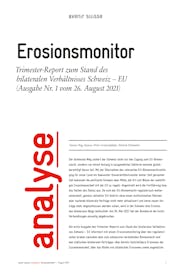The bilateral approach not only secures Switzerland access to the European internal market; so far it has also enabled it to participate in certain sectors on almost an equal footing. In light of the benefits of this framework, there is conscious acceptance of the fact that adopting the relevant EU single market legislation entails a transfer of sovereignty.
For some time, however, politicians have been struggling to regulate the terms of future cooperation with the EU. On 26 May 2021, the Federal Council unilaterally broke off negotiations on the InstA. The aim is to continue or maintain the status quo. Given that the EU single market continues to evolve in terms of regulation. However, according to current EU doctrine, without an InstA the current bilateral agreements should no longer be updated and no new agreements should be concluded; this has prompted fears in Switzerland of an erosion of the bilateral approach.
Considerable Risks
The first edition of Avenir Suisse’s trimester report on the status of the bilateral relationship between Switzerland and the EU provides information on the regulatory gap between the successively deepening internal market and the static bilateral treaties by monitoring erosion: on already discernible impairments to cooperation, on the risk of bilateral erosion, and on untapped potential for cooperation.
However, the ongoing development of the EU internal market entails not only market openings, but also new regulations, the effects of which must be assessed from a liberal free market perspective.
Future-ready European Policy in Five Steps
The interdependence of Swiss companies, workers, researchers, and students with EU member states is too important to allow bilateralism to erode. A sustainable Swiss European policy should therefore be based on five steps:
- Create clarity on Switzerland’s understanding of its own sovereignty
- Strengthen and energize the bilateral approach with a “Bilaterals Plus” package
- Ensure the parties are focused on the commonalities of European policy
- Open up the Swiss internal market and abolish customs duties
- Exploit foreign trade potential beyond the EU internal market.
Further editions of the Erosion Monitor:
Erosion Monitor #2: Report on the Status of the Bilateral Relationship between Switzerland and the EU: A Focus on Education and Research
Erosion Monitor #3: Report on the Status of the Bilateral Relationship between Switzerland and the EU: A Focus on Northwestern Switzerland
Erosion Monitor #4: Report on the Status of Bilateral Relations between Switzerland and the EU: Focus on Western Switzerland and Ticino





